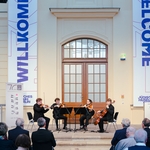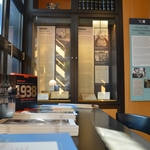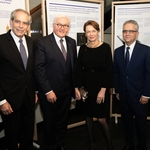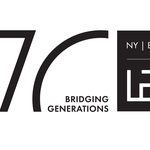An interview with Arnon Goldfinger
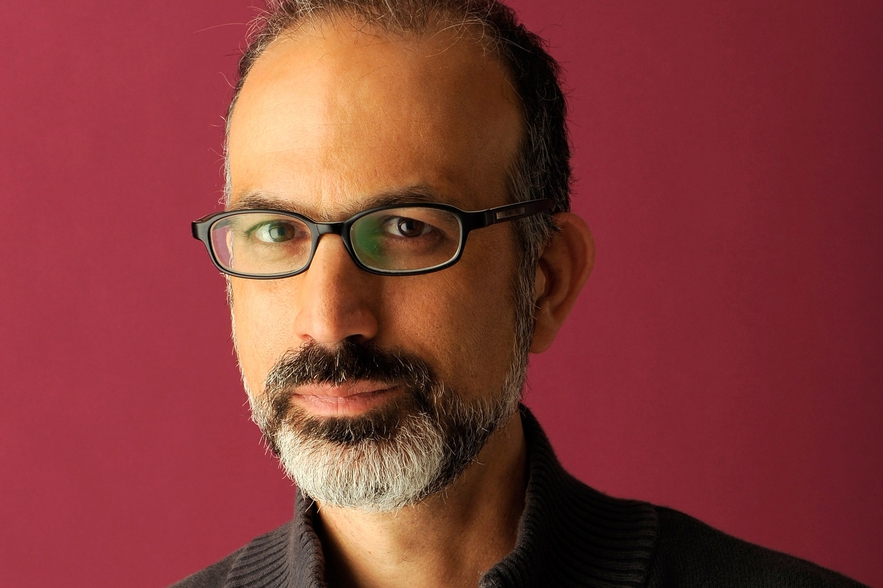
- Autor
- David Brown
- Datum
- Mi., 3. Jun. 2015
Arnon Goldfinger’s 2011 documentary The Flat explores the mystery of his German-Jewish grandparents’ curious friendship with a Nazi official, Leopold von Mildenstein, which he learns survived even in the shadow of the Holocaust. After a screening of the film at the Center for Jewish History on April 14, 2015, we asked him about archives, loss, and memory.
You said that when you first pitched this film, you described it as a story “about what you can learn from the stuff people leave behind.” What did that mean to you?
When my mother gathered the family in my grandmother’s flat to decide to what to do with her things, I instinctively grabbed my camera. My original idea was to document the place; I only meant to collect some memories for the family archive. Eventually I decided I had to make a film—if only to justify my coming with the camera again and again.
I was motivated by the absence of my grandmother. I wanted to capture a glimpse of what can only be seen when a person is no longer alive: a sense of longing, of farewell, of the significance of this now absent person who is still influencing my memories and feelings.
Yet you uncover so many mysteries about your grandmother that the subject of the film seems to develop into what you cannot learn from the things people leave behind.
On one level, you are right. Even before the discovery about the von Mildensteins, one can see the film as the process of asking a person questions you never asked them during their lifetime. For the first time in the film, I have the courage and awareness to ask those very obvious questions.
Why didn’t I ask them before? It was only her absence that created a space for those questions to arise. The whole film is trying to observe what I later learned is called a “silent connection” by psychologists. That is the phenomenon in which families do not discuss their personal histories, especially when intertwined with something painful like the Holocaust. It is a subconscious agreement between generations.
How much of this is human nature? Perhaps children are too close to their parents to view their pasts critically?
My feeling is that it’s a phenomenon related not just to the Jews and the Holocaust, but to immigrant families as well. The 20th century was a time of massive migrations, even before WWII. In audience discussions following screenings of the film, people all over the world told me they had had the same experience. Their parents didn’t talk to them about the past, but in some cases it was related not to trauma, but to migration and the sense that it was necessary to cut off one’s roots in order to build a new life.
There is a special aspect to this with the families of German Jews, however. In the film, I visit my cousin in Germany. He also didn’t know about his own great-grandmother’s fate. For years he thought his parents didn’t tell him because they wanted to protect him. Later, he understood they didn’t tell him because they wanted to protect themselves. There was a lot of wisdom in that. It applies to my grandparents as well. It’s easy to explain why they hid their relationship with the von Mildensteins, but why didn’t they tell their daughter that her own grandmother died in Riga? They wanted to protect themselves.
Protect themselves how?
They were torn. They really longed for Germany. Before Hitler, German Jews were completely equal citizens. My grandfather was a judge—not a judge for Jews, a judge for Germans! He was a real patriotic German who fought at the front in WWI. This ambiguity, this paradox—they were the victims but also part of the nation that committed the crimes—they couldn’t settle it. Each summer they went back. How could they go back to those people, to their friends who committed those crimes? Sometimes the human answer is denial.
The film also paints a vivid portrait of Yekke culture through the objects in your grandparents’ apartment. What was your relationship to that culture growing up?
It was a mix of attraction and dis-attraction. When I was a youngster in the 70s, there was strong and obvious hate toward Germany in Israel. People hated German products, German names, the German language. No one would ever drive a Volkswagen or Mercedes, even if they could afford it. On the other hand, when I visited my grandparents, this scene with all those books and all that culture, education, and poetry—I was so attracted to it. It was all those big names: Mozart, Goethe, Schiller, Schopenhauer—giants of Western culture. I was attracted to this cultural world that was present on my grandparent’s bookshelf, but the echo of the horror that grew from this culture was always in the background.
My previous film was about Yiddish theater. When we made it, people said “who cares about Yiddish in Israel?” But the film was very successful in Israel. People watched it and thought “Yes! This is our culture.” I can say the same thing about this film. In Israel there is a big revival of Yekke culture. When Israel was founded, there was the sense that it was necessary to build a new country with new people by cutting off the Diaspora roots. Now people feel that they missed something. Not just among the Ashkenazim, but among the Sephardim as well.
Aktuelles
